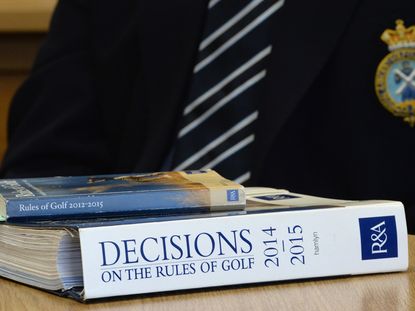Rules of Golf: time for a change?


Golf is in deep trouble with declining numbers of participants and struggling to meet the challenge from other sports and pastimes. Nigel Ellis suggests a radical approach to saving the game he loves...
By Nigel Ellis...
Meeting a distant friend I hadn’t seen in a while, I asked him, ‘How are you enjoying your golf these days?’ Ken is a fine character, but also one of those annoyingly talented people who is proficient at any ball game within five minutes of looking at it. He is of course a good golfer, so I wasn’t prepared for his reply, or what it would start me thinking about.
‘I’m not sure enjoying is the right word’, he said, smiling ruefully. No, he hadn’t just had a bad afternoon, he was telling it like it was; golf can be cruel and frustrating. And the light bulb flashed in front of me, pointing to a link between his negative emotion, which all golfers recognise, and the economic crisis faced by golf courses all over the western world. It is a truism that since golf’s halcyon days of, oh, let’s say a few decades ago, countless sports and pastimes have been invented (or updated) that are giving today’s youngsters more pleasure for their spare time and money. Yet golf seems unable to see itself as others see it.
Jack Nicklaus has said there are three problems with golf: too expensive, too long and too hard. OK, it can be expensive, but so are many other sports. And a full 18 holes does take too long, though a radical approach in New Zealand may provide an answer to this problem. Initiated by Sir Bob Charles, one of the country’s top clubs has created a short form of golf called 30:30, with new forward tee blocks producing a 3000m course made up of six Par 4s and twelve Par 3s. With an electric cart thrown in with the reduced green fee, players can complete a round in under three hours instead of about five hours.
But the main issue, if golf is to raise the appeal of the game itself, is the actual enjoyment and satisfaction for those who play. The physics of the game make it hard to play and the rules make it hard to enjoy.
Imagine the game of golf was being invented now, in the 21st century. How different would it be? Well if I were investing money in this new game I would want to ensure its appeal to all levels, from beginner to expert, because the money has to come from everyone, not just the best players. I might experiment, for recreational play, with a larger, more forgiving golf ball, combined with larger holes on the green. But, I would start by tearing up the rules. And then I’d make a huge bonfire of them and give free drinks to anyone to come along and cheer.
Get the Golf Monthly Newsletter
Subscribe to the Golf Monthly newsletter to stay up to date with all the latest tour news, equipment news, reviews, head-to-heads and buyer’s guides from our team of experienced experts.
Yes, the rules of golf, which arguably suit professional players and those with low handicaps who enjoy the challenge of recovering from a poor shot, are a major part of the problem. In most sports, players are logically penalised for doing something that gives them an unfair advantage, but in golf, players get penalised for random errors such as going out of bounds, scuffing a shot so that your club hits the ball twice, losing your ball in the rough or water, or even hitting an attended flagstick, none of which can possibly confer any advantage. And if you miss the ball completely, you are even penalised by having that errant swing counted as a shot.
And the frustration doesn’t stop there. A good shot can land in a divot hole on the fairway (no, you can’t move it without penalty) or veer only slightly off course and come to a halt blocked by a tree, or fall into a brutal pothole bunker which can guarantee your hitherto promising score gets wrecked. Along with your mood. And why is the game so precious about which tee you play from? My main golf buddy and I seldom hit our tee shots more than 200 yards, so prefer a course length of under about 5500 yards; on most courses this means playing off the front tees. At one course we visited we got such a shocked look as we set up on the ‘ladies’ tee you’d have thought we’d just robbed the till and followed that with a few minutes practising handbrake turns on the 18th green.
Of course recreational golfers everywhere may ignore some of the rules, but seldom agree on which rules deserve a good bending and which don’t.
What the game needs is a set of universally recognised Recreational Rules, agreed by the R&A and USGA, to be used anywhere, anytime (outside competition or handicap-setting) by golfers who just want to enjoy an afternoon out. Rules which take the unnecessary penalties - and frustration - out of the game.
Radical? Maybe. But golf cannot afford to stay on its current track towards becoming a fringe sport for only the talented and time-rich. A fundamental change in approach is needed to make the game more appealing, to get more people to try the game and, having tried it, say to themselves: yes, that was fun. And maybe then I can again ask my friend Ken how he’s enjoying his golf.

Nick Bonfield joined Golf Monthly in 2012 after graduating from Exeter University and earning an NCTJ-accredited journalism diploma from News Associates in Wimbledon. He is responsible for managing production of the magazine, sub-editing, writing, commissioning and coordinating all features across print and online. Most of his online work is opinion-based and typically centres around the Majors and significant events in the global golfing calendar. Nick has been an avid golf fan since the age of ten and became obsessed with the professional game after watching Mike Weir and Shaun Micheel win The Masters and PGA Championship respectively in 2003. In his time with Golf Monthly, he's interviewed the likes of Rory McIlroy, Justin Rose, Jose Maria Olazabal, Henrik Stenson, Padraig Harrington, Lee Westwood and Billy Horschel and has ghost-written columns for Westwood, Wayne Riley, Matthew Southgate, Chris Wood and Eddie Pepperell. Nick is a 12-handicap golfer and his favourite courses include Old Head, Sunningdale New, Penha Longha, Valderrama and Bearwood Lakes. If you have a feature pitch for Nick, please email nick.bonfield@futurenet.com with 'Pitch' in the subject line. Nick is currently playing: Driver: TaylorMade M1 Fairway wood: TaylorMade RBZ Stage 2 Hybrid: Ping Crossover Irons (4-9): Nike Vapor Speed Wedges: Cleveland CBX Full Face, 56˚, Titleist Vokey SM4, 60˚ Putter: testing in progress! Ball: TaylorMade TP5x
-
 Scheffler’s $20,000 Rolex And The $2.5m Watch Bubba Watson Wore At The Masters
Scheffler’s $20,000 Rolex And The $2.5m Watch Bubba Watson Wore At The MastersA number of players were seen wearing designer watches during the week of the Masters, including winner, Scottie Scheffler
By Matt Cradock Published
-
 Scottie Scheffler Is Officially On Best Run Since Tiger Woods
Scottie Scheffler Is Officially On Best Run Since Tiger WoodsData Golf’s analysis has shown that only Woods’ legendary form of 24 years ago is keeping the new Masters champion’s run from being the best in three decades
By Mike Hall Published